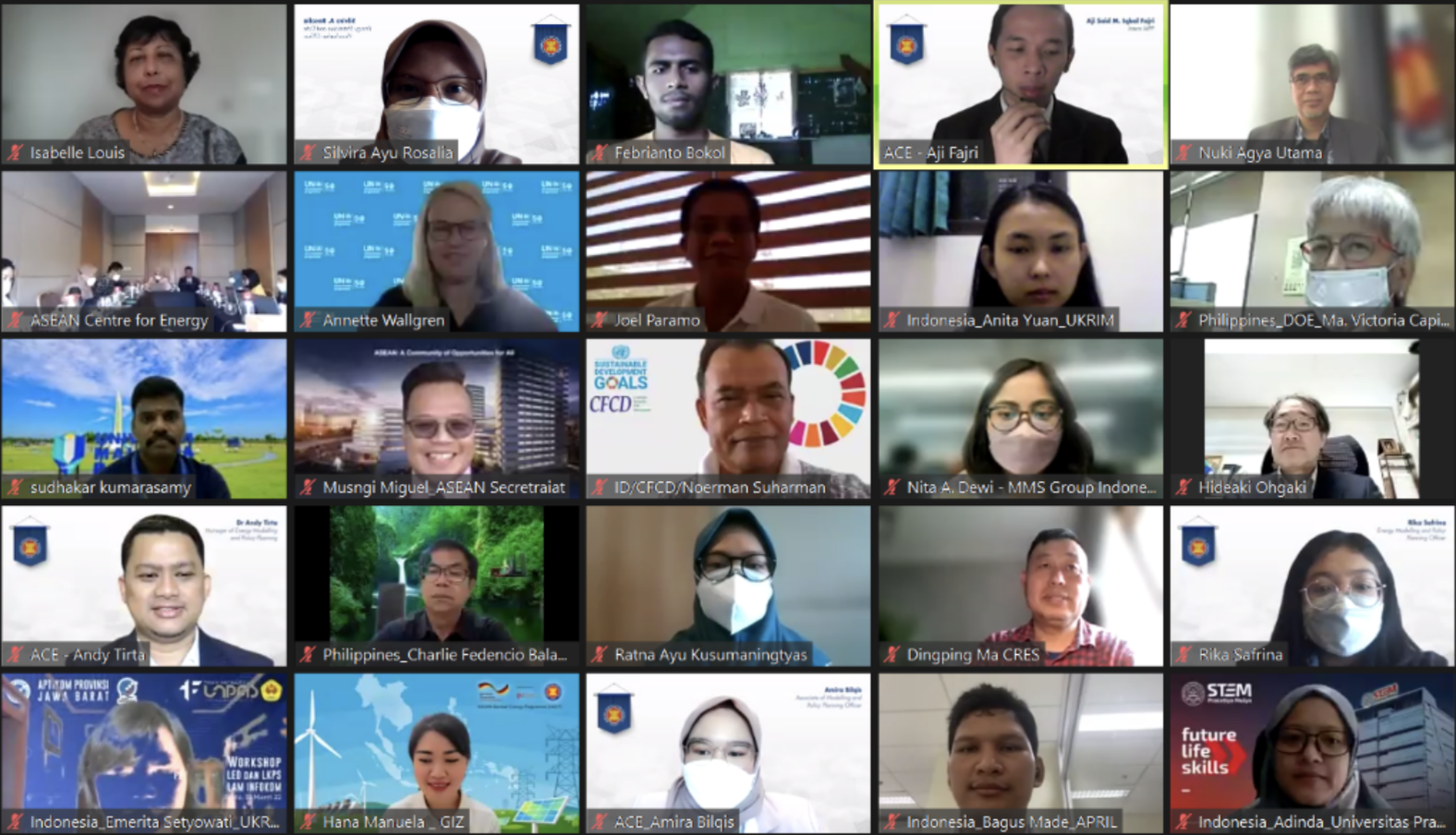Menu
On Tuesday, 22nd March 2022, ASEAN Centre for Energy (ACE) and the United Nations Environment Programme (UNEP) organised the 1st ACE-UNEP Renewable Energy and Gender Workshop and Focus Group Discussion: Accelerate Renewable Energy through Gender Perspectives.
In line with the 39th ASEAN Ministers on Energy Meeting (39th AMEM) calling for an inclusive and just energy transition, ACE invited distinguished guests to present the latest findings and case studies toward more gender-responsive policy approaches, which allowed for the collection of ideas on how to articulate gender-responsiveness in energy policy development.

During the opening remarks, Ms Isabelle Louis, Deputy Regional Director of UNEP Asia-Pacific, and Dr Nuki Agya Utama, Executive Director of ACE, highlighted the significance of gender perspective action for accelerating renewable energy (RE) and its investment while facilitating climate resilience development in the ASEAN region.
To better illustrate the framework of the workshop, Ms Amira Bilqis, Associate Officer of ACE, introduced a study on “Accelerating ASEAN Renewable Energy Deployment through Gender-Responsive Energy Policy Roadmap”. The presentation highlighted ASEAN’s current efforts to stimulate women’s role in sustainable development; however, it lacks an action plan in the ASEAN energy sector. Thus, the project aims to fill these gaps.
Mr Miguel Musngi, Senior Officer of the Poverty Eradication and Gender Division from the ASEAN Secretariat, proceeded to share “State of Gender Analysis on Renewable Energy Sector in ASEAN”. The speaker noted that the availability of clean energy does not automatically translate into gender equality, partly due to socio hierarchies that weaken women’s access to technology or specific programs. He emphasised that more efforts should be made to reach women in rural areas, where vulnerable groups encounter discrimination stemming from traditional norms.
Considering the challenges faced by women in accessing resources and working opportunities in the energy sector, Ms Celia Garcia-Banos, Programme Officer of Policy, Gender, and Socioeconomics from the International Renewable Energy Agency (IRENA), shared her presentation entitled “Renewable Energy: A Gender Perspective” in which she discussed the existing barriers that prevail women from the workplace. As the speaker indicated, social norms remain the biggest challenge to upholding women’s empowerment. Striving to overcome these gaps, it was recommended that networking and support mechanisms be established to leverage education access and enforce transparent workplace regulations.
Mrs Annette Wallgren, Programme Officer Gender & Climate Change from UNEP Asia Pacific, discussed the benefits of women’s entrepreneurship in the renewable energy sector in her presentation on “Gender Integration in Renewable Energy Policy“. Being the energy manager of households, women are the best spokespersons for clean energy, which inspires more women to take on leadership roles and accelerates the green energy transition. It is, thus, recommended that an intervention package consisting of technology and business training, market linkages, access to finance, women’s lead agency and policies to improve women’s businesses should be taking place in energy enterprises.
The discussion continued by Dr Ananth Chikkatur, Chief of Party USAID V-LEEP II, who provided insights on “The Vietnam Low Emission Energy Program (V-LEEP) Gender Toolkit: Promotion of Gender Inclusive Workforce in Large-Scale Renewable Energy Projects”. As an ongoing effort in Vietnam, V-LEEP II aims to strengthen Vietnam’s clean energy transition and foster gender diversity through offering leadership training and supporting the recruitment of women in the energy sector workplace.
Ms Gabriella Ienanto and Ms Crescencia Valentina delivered their speech on “Financing Energy Accessibility through Gender Lens in ASEAN countries “, highlighting the stagnant funding status for gender-energy projects. Moving towards a more gender-equity workforce in the energy sector, it is necessary to develop a roadmap for planning the outcomes for Gender-Energy Access programs and develop better business models that would attract private investors.
Ms Louise McSorley, a Gender Specialist at the Asian Development Bank, shared her presentation on “Benefits and Lesson Learned of Financing Gender-responsive Renewable Energy Business”, depicting the positive outcomes of gender-sensitive energy policies including women’s enhanced role in decision making and better resilience to external shocks. She noted that supporting implementation through capacity building is crucial to ensure practical transition issues for women, enabling the enforcement of respectful workplace policies.
Ms Amira Bilqis invited the speakers to take part in the Q&A session. Responding to the questions from the attendee, Ms Celia Garcia-Banos acknowledged the role of women as a primary energy consumers. Meanwhile, women can initiate dialogues on energy among local communities. Mr Miguel Musngi continued the discussion by indicating the necessity to reduce women’s burden on unpaid work, which constrains women’s involvement in the RE industry. Adding to Mr Miguel Musngi’s statement, Mrs Annette Wallgren stressed increasing women’s access to resources such as technology and financial assistance.
Dr Ananth Chikkatur mentioned that technological advances would unleash women’s opportunity to be inclusively involved in energy development. Ms Gabriella Lenanto further said that the technology would not burden women. It saves time and effectively reduces rural women’s daily task of fetching firewood. To have more gender equality projects, Ms Gabriella Lenanto mentioned that awareness should be spread in communities to secure adequate stakeholder attention. Ms Louise McSorley indicated an ongoing effort toward gender mainstreaming in the water and energy projects. Mr Andy Tirta, Manager of Modelling and Policy Planning from ACE, concluded the session by highlighting the benefits of leveraging women’s energy access while inviting participants to a 2nd workshop on Renewable, Entrepreneurship, and Gender in April 2022.
In addition, the session recording is available to be accessed here.
–
(TZC) (AB)
